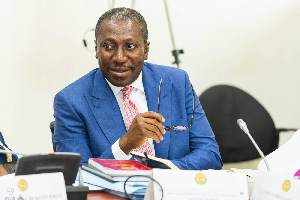Accra, Oct. 11, GNA - Professor Joshua Alabi, Rector of the Institute of Professional Studies (IPS), on Saturday said students who engage in sorcery and occultism chart a course of their lives into self-destruction. He cautioned that "The authorities of IPS would vehemently deal with any student or group of students found culpable of the practice of sorcery and occultism".
Prof. Alabi, who was speaking at the 2009/2010 Matriculation ceremony, organised by the IPS for 3,102 new students in Accra, said the Institute was committed to producing scholars and professionals with practical knowledge and skills relevant for national development.
He said "The Institute is also committed to character development, service to citizenship, truth and honesty as part of its core values. It is mainly for this purpose that 'Scholarship and Professionalism' has become our watch phrase".
Prof Alabi said the IPS would introduce Masters Degree Programme in Accounting and Finance as part of its expansion drive to meet the emerging needs of the country's commerce and industry. He said the IPS has introduced weekend programmes to create opportunities for those who were qualified but could not access higher education because of workplace commitments.
Prof Alabi said that the Institute was still grappling with inadequate infrastructure including lecture theatres and offices for both academic and administrative staff.
He, however, said that the IPS was constructing a new administration and academic complex blocks with support from the GEtfund and hoped that the infrastructural problems of the IPS would be over after the completion of these projects.
Prof Alabi said that the IPS has built a lecture hall with internally generated funds and would construct a club house and tennis, volleyball and basketball courts with funds from the same source. He said though the IPS was an infant educational institution, compared with other tertiary institution in the country, it had been able to catch up in its quest to strive for excellence.
Prof Alabi said "The Institute has established a quality assurance directorate to facilitate the process of academic excellence." He explained that the directorate was charged to carry out systematic and thorough examination of performance of the institute including the management systems and academic staff. Mr. Justice Nii Aryeetey, Chairman of the Governing Council, IPS, advised the students to eschew negative tendencies that could affect their academic performance.
He said:" The IPS programmes aimed at inculcating in you the habit of critical thinking, development and the highest ethical and human values, the pursuit of academic excellence and the appreciation of the importance of hard work and dignity of labour and the need to yield your lives wholly to God".
Mr. Idris Egala, guest of honour for the ceremony, said the IPS was undergoing significant transformation including infrastructural development and varied expansion works aimed at enhancing access to quality education. He called for efforts to address issues on climate change, health care, HIV/AIDS and other diseases and religious extremism. Mr Egala asked students to apply knowledge and experience acquired after school prudently to enable them to lead meaningful lifestyles in "this troubled and turbulent world."
Mr. William Boamah Darpaah, Registrar of the Institute, administered the matriculation oath.
He advised the new students to take the studies seriously and read their hand books thoroughly to enable them to become conversant with the regulations of the Institute.
A total of 1,976 students were admitted for degree programmes out of which 1,184 were males, representing 60 percent, while the number of female students were 792, representing 40 percent. For diploma courses, a total of 921 students were admitted out of which 503 were males, representing 54.6 percent, and 418 females, representing 45.4 percent.
Out of the 205 students admitted for professional programmes, 158 were males and 47 were females.
General News of Sunday, 11 October 2009
Source: GNA
Doomsday for students practicing occultism -
Entertainment











